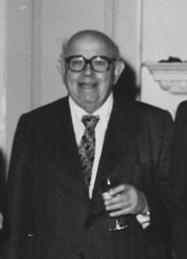Nicholas Kaldor
( economist) | |
|---|---|
 | |
| Born | 12 May 1908 Budapest, Hungary |
| Died | 30 September 1986 (Age 78) |
| Nationality | UK |
| Alma mater | London School of Economics |
| Member of | Königswinter/Speakers |
Hungarian/British economist with large influence on 1960-70 Labour governments | |
Nicholas Kaldor, Baron Kaldor born Káldor Miklós, was a Cambridge economist in the post-war period. He developed the "compensation" criteria called Kaldor–Hicks efficiency for welfare comparisons (1939), derived the cobweb model, and argued for certain regularities observable in economic growth, which are called Kaldor's growth laws.[1] Kaldor worked alongside Gunnar Myrdal to develop the key concept Circular Cumulative Causation, a multicausal approach where the core variables and their linkages are delineated. Both Myrdal and Kaldor examine circular relationships, where the interdependencies between factors are relatively strong, and where variables interlink in the determination of major processes.
His many theories had a relatively large and successful impact on political decisions, including when he was financial adviser to the British Chancellor of the Exchequer during the Labor governments of the 1960s and 1970s.
Biography
He was born Káldor Miklós in Budapest, and was educated there, as well as in Berlin, and at the London School of Economics, where he graduated with a first-class BSc(Econ.) degree in 1930 and subsequently became an assistant lecturer and (by 1938) lecturer and reader in economics. Between 1943 and 1945 Kaldor worked for the National Institute of Economic and Social Research and in 1947 he resigned from the LSE to become Director of Research and Planning at the Economic Commission for Europe. He was elected to a Fellowship at King's College, Cambridge and offered a lectureship in the Economics Faculty of the University in 1949. He became a Reader in Economics in 1952, and Professor in 1966.
From 1964, Kaldor was an advisor to the Labour government of the UK and also advised several other countries, producing some of the earliest memoranda regarding the creation of value added tax. Inter alia, Kaldor was considered, with his fellow-Hungarian Thomas Balogh, one of the intellectual authors of the 1964–70 Harold Wilson's government's short-lived Selective Employment Tax (SET) designed to tax employment in service sectors while subsidising employment in manufacturing. In 1966, he became professor of economics at the University of Cambridge. On 9 July 1974, Kaldor was made a life peer as Baron Kaldor, of Newnham in the City of Cambridge.[2]
Kaldor was invited by then Prime Minister of India—Jawaharlal Nehru—to design an expenditure tax system for India in the 1950s. He also went to India's Centre for Development Studies (CDS) in 1985 to inaugurate and deliver the first Joan Robinson Memorial Lecture. Owing to these links, the Kaldor family donated his entire personal collection to the CDS Library. There are 362 books in the collection and they cover a wide range of titles on economic theory, classical political economy, business cycles and history of economic thought.
References
- ↑ Kaldor, N. (1967) Strategic Factors in Economic Development, New York, Ithaca
- ↑ https://www.thegazette.co.uk/London/issue/46352/page/7918